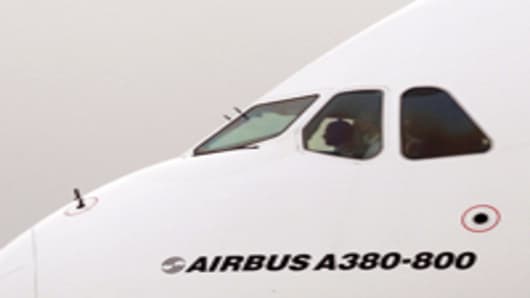The new chief executive of Airbus says he is ready to “bet” that the European aircraft maker’s planned new A350 widebody passenger jet will not suffer the same three-year delay that Boeing had with its 787 Dreamliner.
Fabrice Brégier said in his first interview since taking the top role at Airbus on June 1 that he believed the aircraft maker could hit its revised target to deliver the A350 to its first customer during the first half of 2014, describing the timetable as “challenging” but “achievable”.
Investors in EADS, Airbus’ parent company, are concerned about the possibility of serious delays on the A350 after acute production problems and delays with the A380 superjumbo.
These problems on the A380 have been a big drag on Airbus’ earnings and therefore EADS’ profit, with the superjumbo program’s status only due to switch from loss-making to break even in 2015.
Airbus’ A350 program has already been subject to two delays, pushing back the timetable for delivering the A350 to its first customer from the middle of 2013 to potentially the middle of 2014, partly because of problems with component suppliers.
Asked whether he could reassure investors that the A350 would not suffer the three year delay that Boeing’s widebody 787 encountered before reaching its first customer, Mr Brégier told the Financial Times: “I’m ready to take this bet [that there won’t be a three year delay].”
He went on to say Airbus would “[do] better, let’s put it this way, on the A350 than the market consensus believes we will do”.
Mr Brégier was in charge of the 10 billion euro-plus ($12.5 billion) A350 programme in his previous job of Airbus’ chief operating officer, and is retaining this responsibility as chief executive.
Boeing ran into serious delays with the 787 partly because it undertook a big technology leap by making the aircraft mainly out of carbon fibre reinforced plastic instead of aluminium alloy.
The carbon fibre is lighter than aluminum, and therefore provides significant fuel savings compared to current generation aircraft.
Airbus is embarking on a similar technology leap on the A350, with about 53 per cent of the aircraft due to be made from carbon fibre.
Boeing’s 787 programme also ran into difficulties because of problems with suppliers.
Airbus’ problems with suppliers on the A350 contributed to last November’s announcement by EADS that the aircraft’s “entry into service” date would be pushed back to the first half of 2014. EADS took a 200 million euro charge against its earnings.
Mr Brégier said he was seeking to ensure that the first A350 flight aircraft was free of glitches, so that production could be increased smoothly thereafter.
He insisted Airbus was well placed to grow its earnings, and so make a bigger profit contribution to EADS, on the back of increased aircraft production.
“I’m sure that we will increase gradually the profitability of Airbus,” he said.


